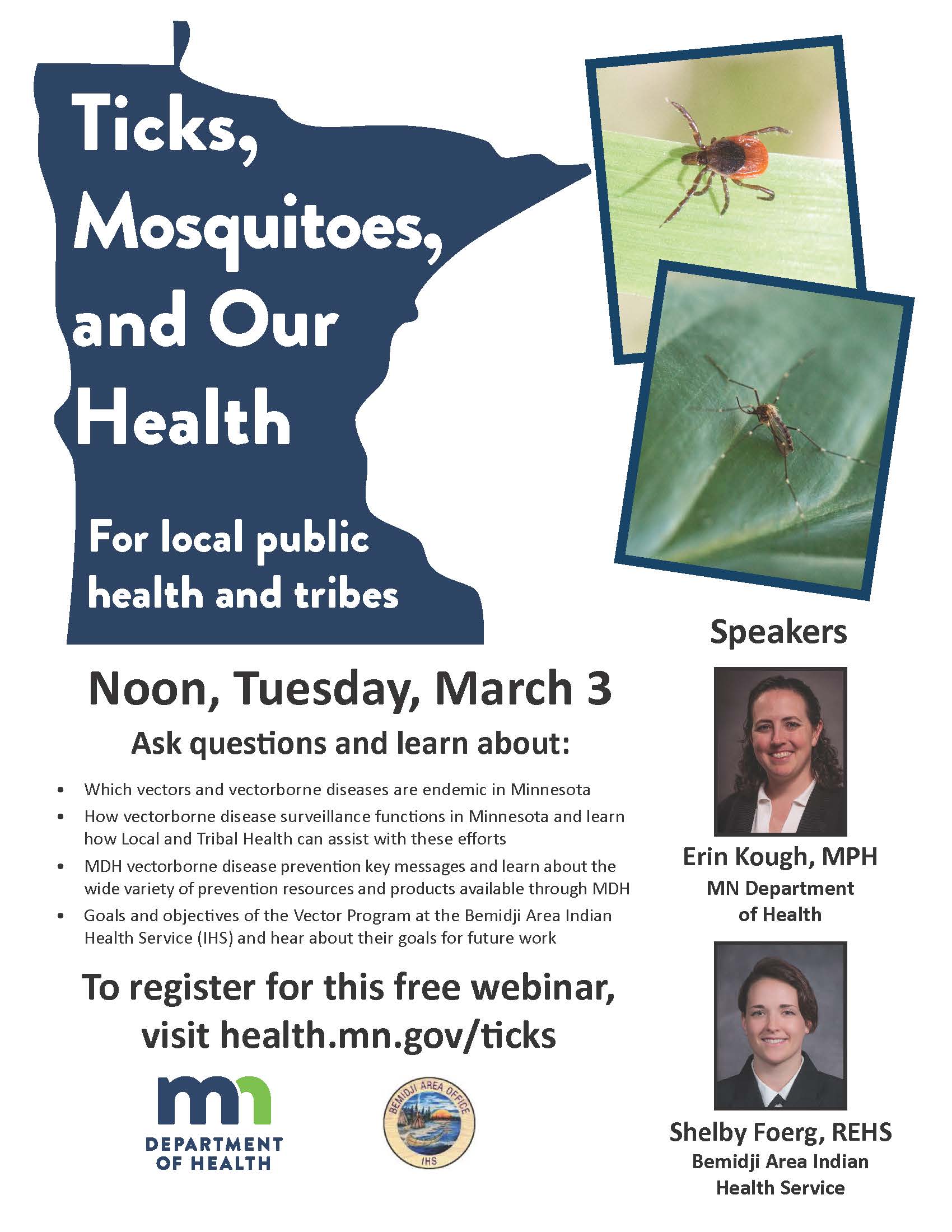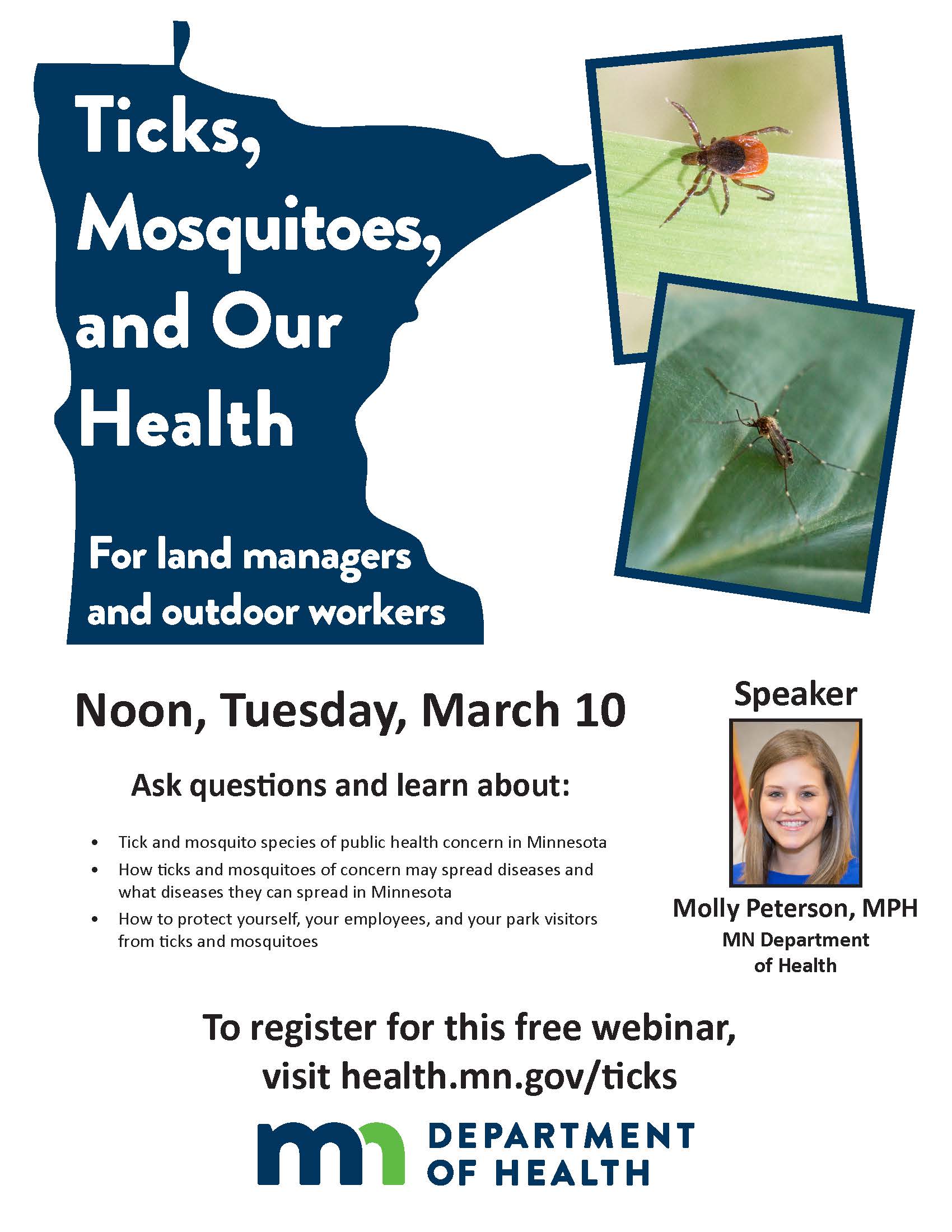Contact Info
Ticks, Mosquitoes & Our Health
March 2020 Webinars
Join us over your lunch hour and let us answer all of your questions about ticks and mosquitoes!
Have you ever wondered how long a tick lives? Or how the diseases that ticks spread are diagnosed? Or maybe you just want to know how to avoid tick and mosquito bites?
This March, the Minnesota Department of Health is offering a series of five webinars that will focus on ticks, mosquitoes, and our health. Each of the webinars will cover similar information yet focus on answering questions that each particular type of audience may have. Expect to learn more about which types of ticks and mosquitoes live here in Minnesota, the health risks associated with them, and how to better enjoy the great outdoors by keeping ticks and mosquitoes away.
Registration
For more information or to register for this free learning opportunity, select which webinars you’re interested in:

Objectives
- Which vectors and vectorborne diseases are endemic in Minnesota
- How vectorborne disease surveillance functions in Minnesota and learn how Local and Tribal Health can assist with these efforts
- MDH vectorborne disease prevention key messages and learn about the wide variety of prevention resources and products available through MDH
- Goals and objectives of the Vector Program at the Bemidji Area Indian Health Service (IHS) and hear about their goals for future work
An active learning worksheet for this webinar is available in completed and fillable formats.
Register

- Objectives
- Tick and mosquito species of public health concern in Minnesota
- How ticks and mosquitoes of concern may spread diseases and what diseases they can spread in Minnesota
- How to protect yourself, your employees, and your park visitors from ticks and mosquitoes
Register
- Due to staff reallocations related to coronavirus, this webinar has been postponed. Email bugbites.health@state.mn.us for more informtion.
Objectives - Which vectorborne diseases are endemic in Minnesota
- How patients may be at risk for tick and mosquito bites, either at home, work, or while traveling
- How to prioritize testing for vectorborne diseases based on patient exposure histories, symptoms, and Minnesota ecology
It is the policy of the Minnesota Medical Association (MMA) to ensure balance, independence, objectivity, and scientific rigor in its CME activities. To comply with the Standards for Commercial Support of the Accreditation Council for Continuing Medical Education (ACCME), the MMA requires planning committee members and faculty to disclose any relevant financial relationship they and their spouse/partner has with a commercial interest. The remaining members of the faculty and planning committee for this conference have indicated that they have no relevant financial relationships to disclose related to the content of the CME activity. Faculty members have declared that they will uphold the MMA’s standards regarding CME activities and that any clinical recommendations are based on the best available evidence or are consistent with generally accepted medical practice. Please indicate in the comments section of the evaluation form whether you detect any instances of bias toward products manufactured by commercial interests.
CME Credit:
This activity has been planned and implemented in accordance with the accreditation requirements and polices of the Accreditation Council for Continuing Medical Education through the joint providership of the Minnesota Medical Association and Minnesota Department of Health. The Minnesota Medical Association (MMA) is accredited by the Accreditation Council for Continuing Medical Education to provide continuing medical education for physicians. The Minnesota Medical Association designates this enduring activity for a maximum of 1 AMA PRA Category 1 Credit(s)™. Physicians should claim only the credit commensurate with the extent of their participation in the activity. Other health professionals (physician assistants, nurse practitioners, nurses, etc.) who participate in this CME activity may submit their Statements of Attendance to their appropriate accrediting organizations or state boards for consideration of credit. The participant is responsible for determining whether this activity meets the requirements for acceptable continuing education.
Commercial Support:
There is no commercial support for this event.
A commercial interest is any entity producing, marketing, re-selling, or distributing health care goods or services consumed by, or used on, patients
The ACCME defines "'relevant' financial relationships” as financial relationships in any amount occurring within the past 12 months that create a conflict of interest.
To access the archived webinar after 3/17/20, visit www.mnmed.org.
- Due to staff reallocations related to coronavirus, this webinar has been postponed. Email bugbites.health@state.mn.us for more information.
Objectives - Understand which vectorborne diseases are endemic in Minnesota
- Learn which testing for endemic and travel-associated vectorborne diseases is available at the MDH Public Health Laboratory
- Explain the methodologies used and correct interpretations for vectorborne disease testing at the MDH-PHL
- Describe current and future MDH vectorborne research projects
- Minnesota Department of Health is approved to provide 1.0 credit of continuing education in the clinical laboratory sciences by the ASCLS P.A.C.E.™ Program. No prior knowledge is necessary to attend.
- Objectives
- Vectors and vectorborne diseases endemic to Minnesota
- When and where disease risk is highest in Minnesota
- Clinical signs, diagnostics, and treatment for humans and animals
- Reporting vectorborne diseases to the Board of Animal Health
- The webinar has been approved for veterinarians and veterinary technicians to receive one Minnesota Board of Veterinary Medicine continuing education credit.
Register
Don’t worry if you can’t watch the live webinar on the date you’re most interested in - simply tune into a different webinar or come back later to watch all of the archived webinars that will be posted shortly after the live event. Questions? Call 651-201-5414 to speak with staff from the Vectorborne Diseases Unit.
Other resources
Mosquitoborne Disease Materials
Mosquitoborne Disease Videos
Tickborne Disease Materials
Tickborne Disease Videos
